If you’re looking to discover the best Irani cafe in Mumbai, B Merwan is a must-visit. It’s not just an ordinary café; it’s a slice of Mumbai’s history. While the concept of Irani cafes today might be vanishing quickly with the introduction of Starbucks and Café Coffee Day, it continues to cater for the people of Mumbai with the same spirit and enthusiasm.
Growing up in Grant Road, I have fond memories of my father bringing fresh, hot mawa cakes from B Merwan every Parsi New Year, a tradition I still hold dear.
As a child, I’d also grab a quick Irani chai and brun maska here before heading to school. Even today, B Merwan’s mawa cake still reigns supreme. Its flavour remains as perfect as ever, unchanged through the years.
The B Merwan Irani Café Experience
One of the unique things about Irani cafes in Mumbai is that they immediately transport you back in time. Being one of the best Irani cafes in Mumbai, expect nothing less from B Merwan & Company. Just outside Grant Road railway station, this spot is perfect for a quick breakfast on the go.
The moment you step into B Merwan, you understand why it’s considered one of the best Irani cafes in Mumbai. This place still holds the charm of Mumbai’s old world which is soon fading away.
From the early morning rush to the constant clinking of cups and saucers, there’s a unique energy in the air. It’s the kind of place that eliminates all the frills and fancies and keeps the experience real and straightforward.
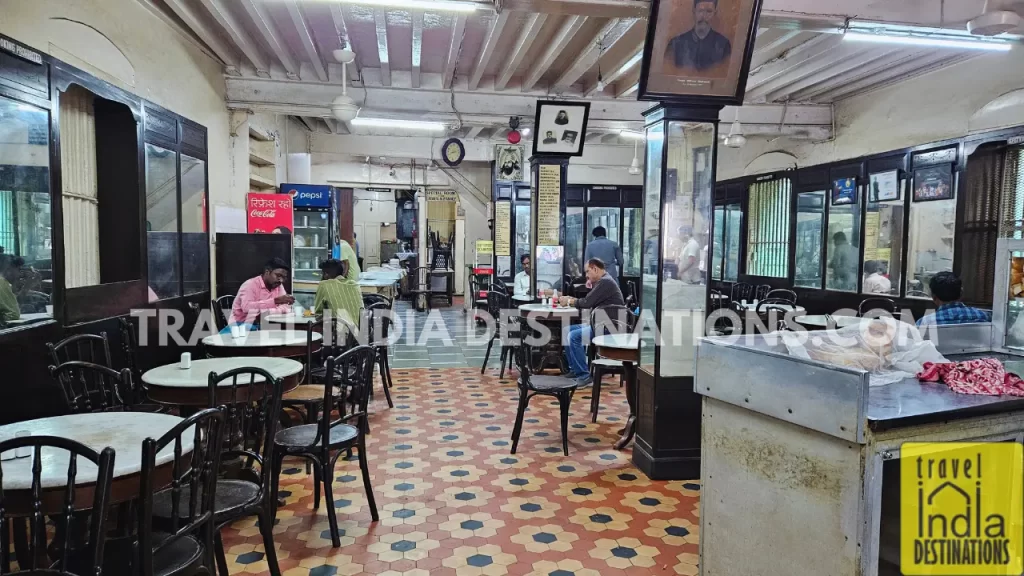
The interior is rustic and full of character. The walls are lined with glass and wooden décor and shelves stacked with products to sell. The old-fashioned geometric floor tiles seem to tell stories of an era long gone. It’s a nostalgic atmosphere that transports you to the 1900s, a Mumbai that once was.
Apart from its rustic interiors, what truly sets B Merwan apart is its no-frills service. There’s no fancy menu card here, just a menu board with the day’s offerings.
You don’t pick your table; you pick your seat.
Strangers can often sit together, sharing a table in the true communal style that defines Irani cafés.
If visiting with family, especially ladies, look for the family room near the kitchen. It offers a quieter corner amidst the morning rush.
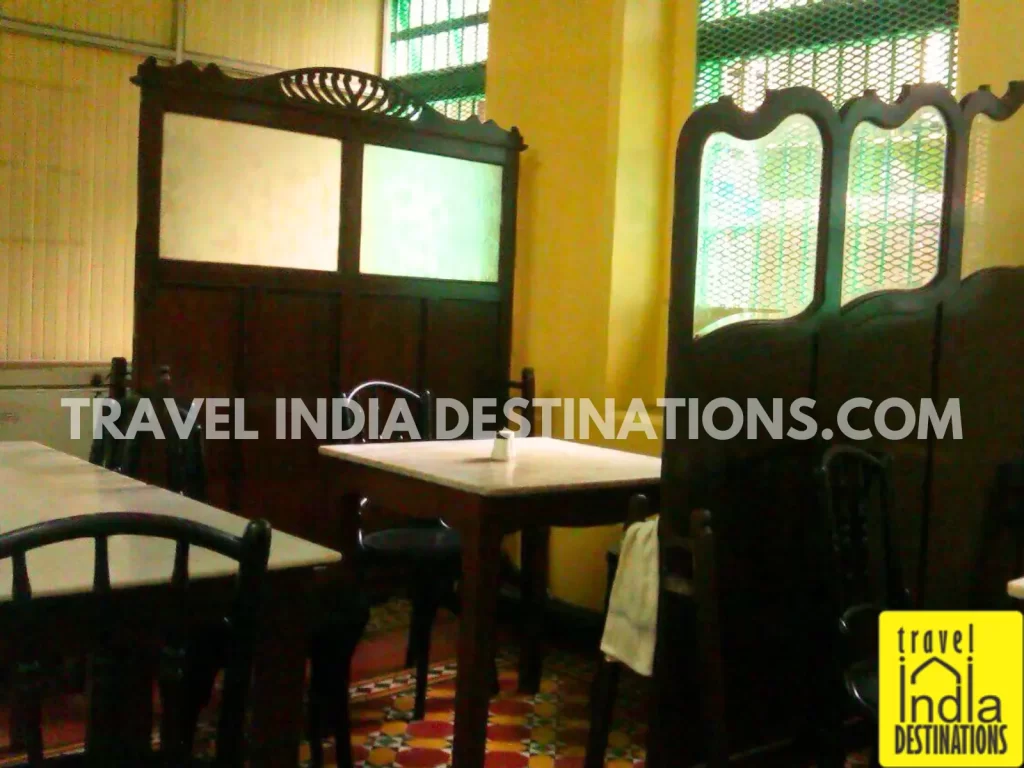
There are no checks or bills here. Once you’re done, you simply ask your order-taker for the total, and they’ll tell you the amount aloud. When you reach the cash counter, the same total is confirmed by the counter person.
B Merwan also functions as a provision store, selling everyday essentials like chocolates, syrups, soaps, razors, toothpastes and other items — a living reminder of the café’s early 20th-century roots.
In my many visits, one thing stood out the most: the personal touch of the staff. There’s a certain humility in the way they serve, especially the owner, who still ensures everything runs smoothly.
I’ll never forget a time when I was sitting at a table with dirty cups and saucers from a previous customer. The owner, sitting at the cash counter, noticed and came over personally to clean it. Though I hesitated, telling him that the order-taker would handle it, he insisted. “This is my establishment, and you are my customer,” he said, “there’s no shame in treating you right.”
That moment of care left an impression on me — it’s not just about food; it’s about respect for the customer. A rarity these days.
Experiences like these make B Merwan not just historic, but truly deserving of its place among the best Irani cafes in Mumbai.
The History Behind B Merwan Irani Café
Established in 1914, B Merwan Irani Café is more than just a café; it’s a piece of Mumbai’s history. Founded by Boman Merwan Nasrabadi, this iconic establishment has been serving the locals of Grant Road for over a century, offering a warm, inviting atmosphere that feels frozen in time.
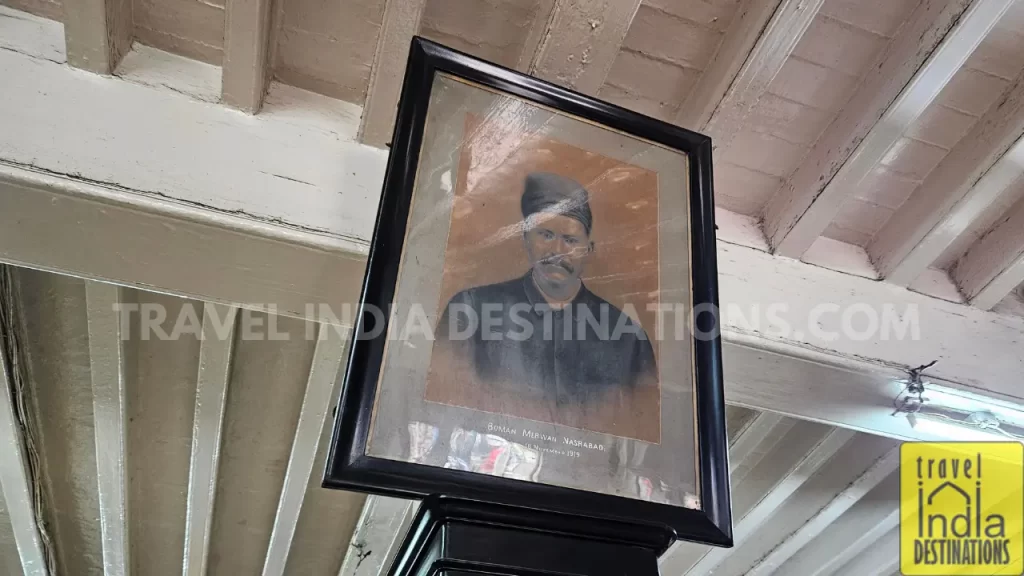
As one of the oldest Irani cafes in Mumbai, B Merwan holds a special place in the hearts of Mumbaikars. The café quickly became a hub for the local Parsi community and others, offering simple yet delicious treats like mawa cakes, Irani chai, and brun maska.
It’s this unpretentious, no-frills approach that has kept B Merwan relevant even in today’s fast-paced, modern Mumbai.
Though much has changed in the city around it, B Merwan remains a constant — a place where tradition is honoured and the essence of old Bombay is still very much alive.
Today, the café is run by Boman Merwan’s grandsons, who continue to uphold the values of hard work and hospitality that their grandfather established over 100 years ago.
The fact that B Merwan has survived the test of time speaks volumes about the importance of community, tradition, and good food.
In an age where high-end, trendy cafés dominate the scene, B Merwan stands as a reminder of simpler times, offering an authentic, timeless experience for those who step through its doors.
What to Eat at B Merwan & Co:
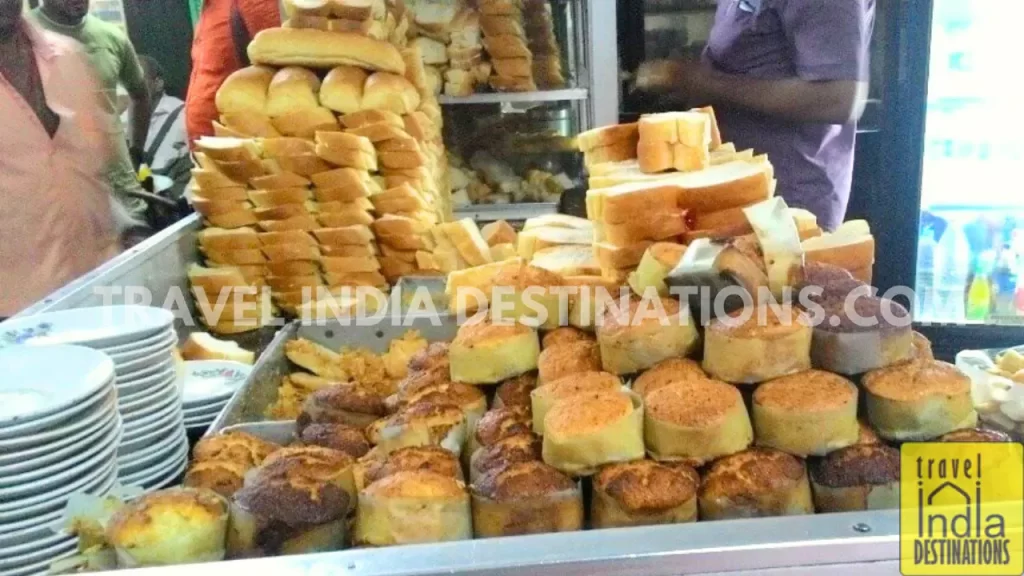
While you might expect something fancy being at one of the best Irani cafes in Mumbai, the menu at B Merwan is as unpretentious as the café itself. Hence, you will have to do away with fancy dishes and instead focus on classic comfort food that keeps you coming back for more.
Here, you get to savour the essence of traditional Irani café fare, perfect for a quick snack or a leisurely breakfast.
Mawa Cake: The star of the menu, these buttery, crumbly cakes are the true soul of B. Merwan. Fresh out of the oven, they sell faster than you can blink — and once you try one, you’ll understand why. The taste hasn’t changed in decades, and that’s exactly what makes them so special.
Irani Chai: A strong, fragrant cup of Irani chai is a must-have. It’s the drink that’s meant to be sipped slowly, while you enjoy the chaos of the café around you. This tea is refreshing and ideal for any hour of the day.
Brun Maska: The perfect accompaniment to your chai is the famous brun maska — crispy, warm bread served with a generous dollop of butter. It’s the perfect way to kickstart your morning or enjoy a snack.
Bun Maska: Similar to brun maska, but with a softer bun. It’s a must-try for anyone visiting the café, offering a warm, soft and comforting bite.
Omelette Pav: A simple omelette, served with bread or toast, is another popular choice at B Merwan. It’s quick, filling, and pairs perfectly with the tea.
Apart from these traditional servings, you can also opt for Burji Pav (scrambled eggs and bread), jam puffs, mawa samosas and bread pudding. This simple, honest food is one of the reasons B Merwan remains a strong contender for the best Irani cafe in Mumbai title.
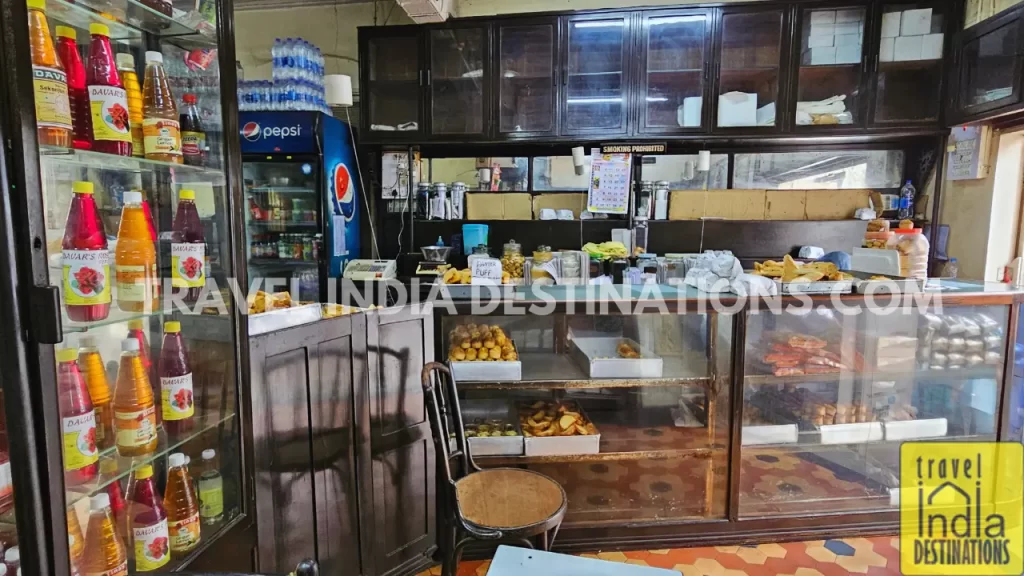
Why Irani Cafés in Mumbai Are So Special
Of course, when you compare some of the modern artisanal cafés with the best Irani cafes in Mumbai you will find a vast difference. While Irani cafés lack the sophistication and luxury that these modern cafés offer they still hold a special place and offer historic connection.
The story of Mumbai’s Irani cafés begins 1300 years ago with the Parsi and Iranian immigrants who made the city their home over a century ago. They brought with them a love for hospitality — simple, heartfelt, and grounded in tradition.
Back in those days, various offices and mills were located in South Mumbai. The initial intention of Irani cafes thus remains to serve the people and it was never really a business proposition that would think in terms of capital growth. And this idea remains intact.
In the year 1904, Kyani & Company was established making it the oldest Irani cafe in Mumbai, followed by others including B. Merwan & Company. Most of these Irani cafes charge you a minimum cost for the tea and snacks they offer on the menu.
Over time, these cafés became essential landmarks across Mumbai’s busy streets, serving affordable tea, snacks, and warm conversations.
Unlike modern coffee chains that thrive on sleek interiors and curated experiences, Irani cafés are refreshingly no-frills.
No plush sofas, ambient music or Wi-Fi passwords.
Just basic wooden chairs, marble-topped tables, and the comforting clink of teacups in the background.
However, what truly sets Irani cafés in Mumbai apart is their communal spirit.
Here, strangers share tables without a second thought. A quick breakfast of brun maska and chai often turns into a hearty chat with someone you just met. Try doing that in a Starbucks, if you will.
At B Merwan, it’s not just about what’s on your plate — it’s about the memories and the conversations.
Similar to the legendary old theatres in Mumbai, which have stood the test of time, Irani cafés are an enduring part of the city’s cultural tapestry.
If you’re curious about other nostalgic places in Mumbai, check out our article on Old Theatres in Mumbai, where we explore 25 timeless single-screen cinema halls that continue to keep the spirit of old Bombay alive.
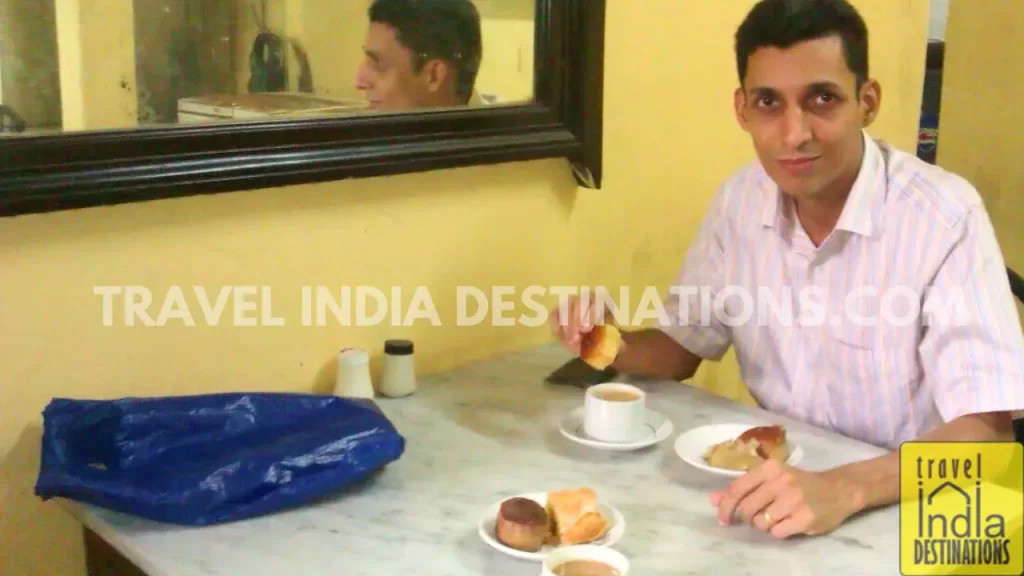
Conclusion: A Slice of Mumbai’s Soul
B Merwan isn’t just an ordinary Irani cafe in Mumbai.
It’s a window into Mumbai’s heart — a living, breathing reminder of a simpler time.
The hot mawa cakes melt in your mouth, and the classic glass and wooden décor surrounds you with nostalgia.
You don’t just taste the food; you experience the legacy — a legacy built on tradition, community, and timeless charm.
In a chaotic city, places like this remind us to slow down, share a table with strangers, and savour the little things.
It’s no wonder B Merwan continues to be celebrated as the best Irani cafe in Mumbai, loved by generations who return not just for the food, but for the feeling of coming home.
So the next time you find yourself at Grant Road, step inside B Merwan & Company.
Order a chai, grab a mawa cake, and for a brief, beautiful moment — be a part of Mumbai’s living history.
Have you experienced the timeless charm of the best Irani cafe in Mumbai? Share your B Merwan story with us!
22 comments
Your article brings back wonderful memories! Thank you.
Thank you Kanchi. The purpose of this blog post was to create a feel of nostalgia.
This is a wondeful portrayal of a lasting business in your city. It very much resonates with me as we have a similar place i New Orleans called Cafe Du Monde. French is the orevailing influence in New Orleans and this cafe was designed originally with that in mind. In all these many years, though their popularity has grown, they have never changed their simple method or style of serving strong Cafe Au Lait with deep fried nuggest of piwdery heaven called beignets. I love businesses that do not conform to the seeming demands of commercialism.
Thank you for your comments. Although, these Irani cafes never really get highlighted in a glittery world, but I can say that they have served almost four to five generations, considering that I am in the fifth generation category. Back then in that era it was all about the people and service so I wanted to put that concept forward to the people of India and even globally.
And you did so very well. I like the photos you took as well. They certainly do not portray a glittery world but it has a very ordinary feel and that appeals to me.
I had a similar post about small breakfast shops in the US. It’s so good to read these descriptions about places like this in other countries. My guess is that many will survive, at least I hope so. The big brands have to focus on costs, and quality will eventually suffer. The places you’ve described here should not be allowed to fall away. Thanks for sharing a slice of life from a distant land.
These cafes still attract large number of people here in Mumbai, but Indians are passionate about American products here, especially the younger lot so they choose Starbucks over this, they get this feel of sophistication and classy appeal that these cafes wont offer.
That’s sad. I’m not sophisticated but I seek out places like you describe in every city I visit. I don’t travel much outside the US but on a recent trip to England, a friend took me to a small private cafe. I had one if the best breakfast sandwiches ever.
These are really interesting observations and photos — thanks for highlighting something that isn’t mainstream for tourists. I hope there continues to be support for these cafes — maybe blog posts like yours will help with spreading the word. It’d be a shame if giant chains like Starbucks crowded them out.
Thank you Jaime. The cafe in the picture celebrated 100 years this year, but unfortunately they are closing down on March 31. I have visited this place for almost three decades now. In fact, my school was just right next to it, so I would come here for early morning breakfast and I would rush out as soon I hear my school bell at the start of the day.
That’s too bad it’s closing. Cafes like that one give a place its character.
What a wonderful post! I traveled to India as a young man, many more years ago than I care to remember, and is indeed one of the places I wish to return when I retire in a few years.
This is a beautifully written and nostalgic post, and the accompanying photographs compliment your account most vividly. Whilst i appreciate that times change and that society evolves and moves on, it is saddening that all to often it has to be at the expense of culture and heritage, and that the needs and wishes of local people are so often set aside for the needs of big business. Much the same is happening here in London; a number of local city markets are slowly being eroded and closed down as their valuable free-holds are bought up by the multinationals and property developers.
My compliments for a superbly written and illustrated piece…
Thank you for your comment. I am glad that you have been to India even though it was long time ago and that you would like to return. I know it might have faded out of your memory, but I am still curious to know where did you stayed in India during your visit.
Your description is excellent and it awakes a strong sense of nostalgia for valuable things now lost, maybe lost, about to be lost, or just missed. I have seen what happens when huge international brands invade a city. Recently, KFC opened in Nairobi, and there are already stories that McDonald’s is coming. The local restaurants and cafes like Steers, Wimpy, Galitos, Kenchic, etc are rapidly losing customers, and, with time, might close down for good. Thenceforth they will only be memories in our heads, after all these years of decent service. Most businesses these days target the youth, but, I think, the youth anywhere in the world love American products, with complete disregard to the old and the quaint. If it is American, it must be a good thing–this seems to be the preponderant thought amongst them. As the world shrinks and we all become closer and closer to one another, at least in distance, so many changes will take place and so much will be lost that I think it will totally useless to hold dearly an attachment to a property that is not under the direct influence of one–but even those directly controlled inevitably wither away as well. What lasts in this strange place, this world, whether our home or prison?
Thank you for your comment Peter. Well, change is inevitable so I cannot blame completely these multinationals. It also depends on the people that want better lifestyle and sophisticated places to hang around rather than sitting in a cafe that does not give importance to ambience and classy appeal.
I could live in their kitchens for their food and bakes ! Loved loved loved the post.
My mother used to cook some great Parsi food, I love visiting Irani cafes from time to time.
I have a Parsi aunt but she can barely cook . I visit Kayanis often.
Great. I love Kayani’ mawa cakes.
Quite agree these cafes have a sense of service and tradition over crass commerce 😉 Personally I love them!
I’m a Parsi so all this bun maska and pudding and custard is a part of my DNA. I love Starbucks, but at the same time these 100 year-old establishments are an integral part of our lives and seeing them go away due to fierce business competition makes me feel sad.
When we have friends coming to visit, places I take them are Irani restaurants, udipi in Matunga, the cheaper gomantak joints for fish… and if can swing with a friend with membership – a slice of history at the Yacht club. More recently I’ve added The Bombay Canteen to the list for its mix of being a ‘happening’ place that has newly inspired canteen khanna. 🙂